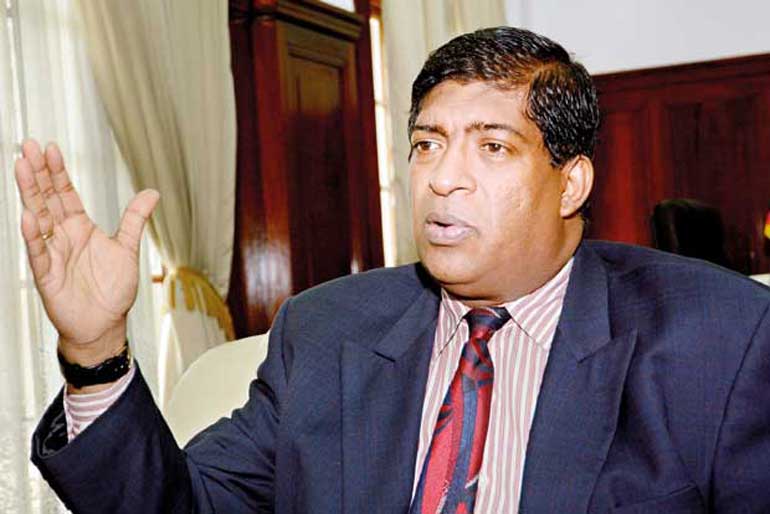Monday Feb 16, 2026
Monday Feb 16, 2026
Wednesday, 9 November 2016 01:26 - - {{hitsCtrl.values.hits}}
On the eve of Budget 2017 Finance Minister Ravi Karunanayake yesterday assured the highly-anticipated policy document would be a pro-growth Budget that would “rectify all anomalies” of previous Budgets and create jobs.
Karunanayake will present the third Budget of the Government jointly formed by President Maithripala Sirisena and Prime Minister Ranil Wickremesinghe on Thursday afternoon in Parliament. This will be the 70th Budget of Sri Lanka, the Finance Ministry said in a statement yesterday.

“The 2017 Budget will be a pro-growth Budget which will focus on the deficiencies for the last several years. Accordingly the Budget will have proposals to rectify all the anomalies that are there to deal with the export sector to create jobs,” it added.
“It will be a real overview of all the sectors of the economy that is beneficial to the people in the short run and long run,” Karunanayake was quoted as saying.
The Minister reiterated the economy inherited was not easy for any finance minister to manage due to over Rs. 9.9 trillion in public debt besides Rs. 1.2 billion debt off the balance sheet. However, with strict financial discipline, the Government was able to pay attention to financial consolidation and reduce the deficit.
The Government targets a fiscal deficit of 3.5% of GDP by 2020 with plans to reduce it to 4.7% in 2017 from 5.4% in 2016. Economists and financial analysts, however, have insisted Sri Lanka overshot its deficit target to about 7.4% last year.
Sri Lanka’s GDP has also increased to Rs. 11,183 billion ($ 82.3b) in 2015 from Rs.6, 414 billion ($56.7b) in 2010. The 2017 Budget is expected to allocate around Rs. 380 billion to welfare and subsidies, the Finance Ministry statement noted.
Once the Budget is presented in Parliament on Thursday the debate on the second reading and the committee stage will continue till 10 December when a final vote will be taken.
Reuters: Sri Lanka’s 2017 Budget plan will seek to boost revenues through a Capital Gain Tax on properties, simplify tax collection and offer incentives to spur exports, though progress will depend on the Coalition Government agreeing on economic priorities, analysts say.
Finance Minister Ravi Karunanayake, who will present the Budget on Thursday, expects to bring down the budget deficit to 4.7% of Gross Domestic Product from this year’s 5.4% in line with the commitment the Government gave the International Monetary Fund in return for securing a $1.5 billion loan.
“It will be a progress-oriented, people-friendly budget with financial discipline,” the businessman-turned-politician, told Reuters on Tuesday.
Karunanayake said the Budget will focus on proposals to rectify incongruous export sector rules to create jobs.
The Coalition Government of President Maithripala Sirisena’s centre-left party and Prime Minister Ranil Wickremesinghe’s centre-right party struggled to implement key 2016 Budget proposals as they disagreed on raising the Value Added Tax (VAT) until early this month.
Marie Diron, Associate Managing Director at Moody’s, said the budget deficit will narrow but more slowly than currently envisaged by the Government under the IMF programme.
“Higher VAT rates and improved tax administration and compliance through RAMIS are unlikely to narrow the deficit to the extent current envisaged,” she said.
“We think that there are risks that the deficits remain larger than currently projected,” Diron said, adding that slower nominal GDP growth implies a possible rise in Government debt in the near term.
Karunanayake expects revenue to improve through a more streamlined and simplified automated tax collection system, known as the Revenue Administration Management Information System (RAMIS).
The Budget is also expected to introduce Capital Gain Tax on properties with less than 10-year ownership and a lower tax regime to boost faltering investment, Government officials say.
Karunanayake said the authorities have more than doubled personal tax files to 1.4 million this year from the last year’s 599,000 in a move to raise Sri Lanka’s low tax compliance rate.
The Government’s medium-term economic strategy foresees cutting the deficit to 3.5% of GDP by 2020 while increasing the direct taxes.
The Government faced a debt and balance-of-payments crisis early this year before the IMF came to the rescue with the loan in May. The Central Bank expects the $82 billion economy to grow between 5-5.5% this year, higher than last year’s 4.8%.
Subashini Abeyasinghe, Senior Researcher at Colombo-based Verité Research, said consensus in the Coalition Government around the Budget proposals will be critical for making progress.
“Lack of consensus like this year ... will lead to reversal of the proposals and a significant amount of uncertainty,” Abeyasinghe said.
“I think we need to see much more coordination and consistency between the President and the Prime Minister.”